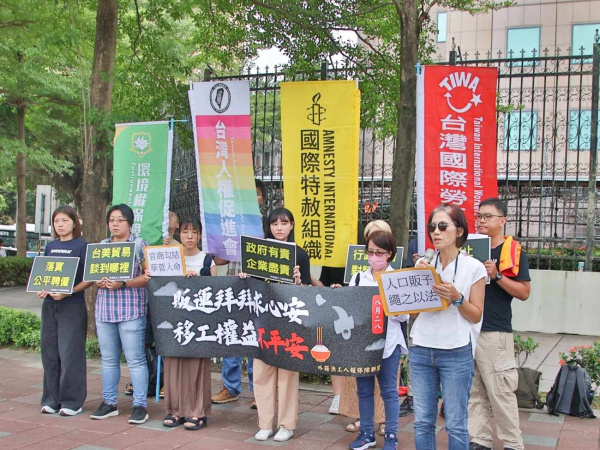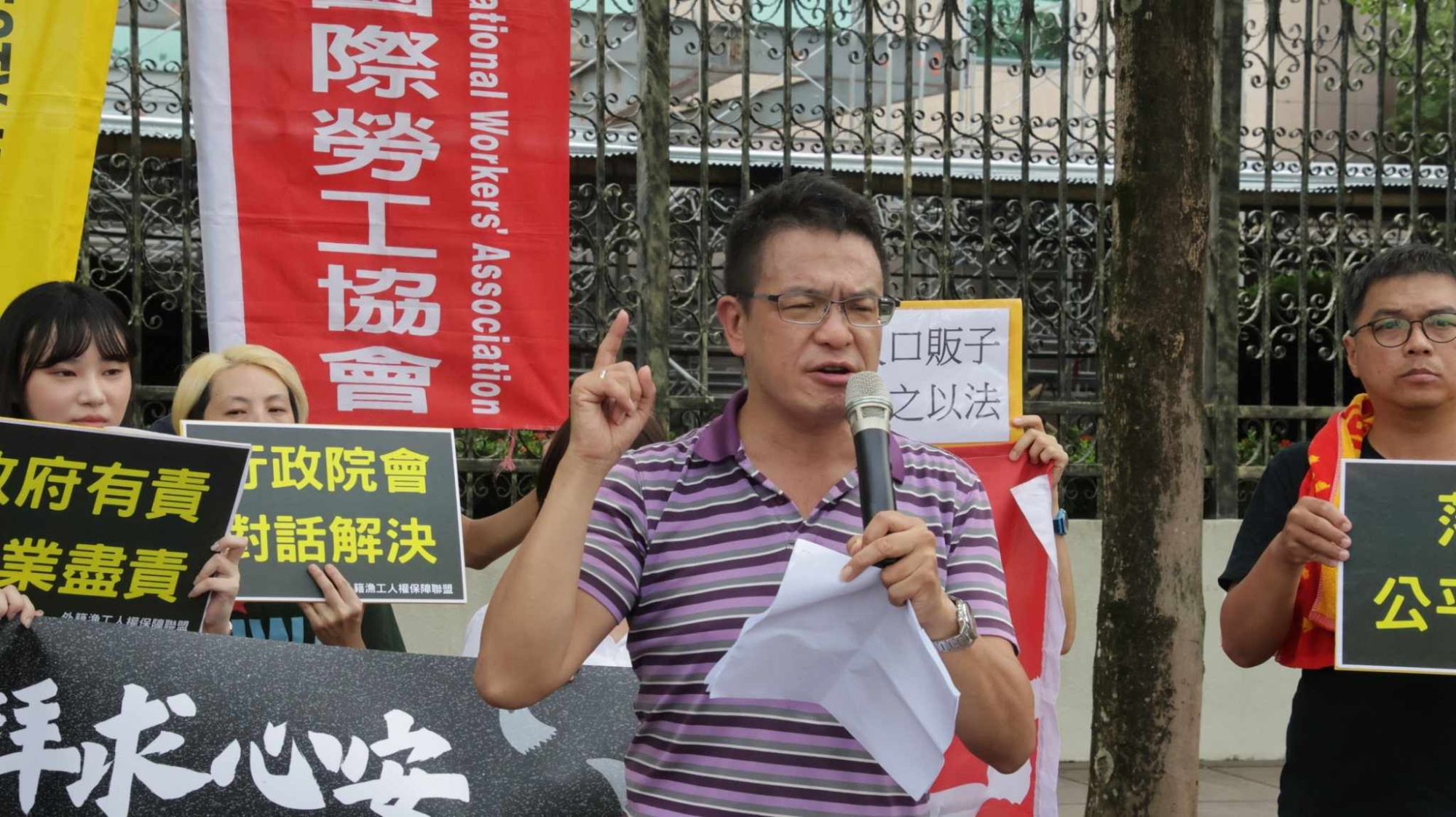
August 28, 2024
Every year, after the U.S. Department of State releases its annual Trafficking in Persons (TIP) Report, Taiwan's Executive Yuan holds the "International Workshop on Combating Human Trafficking." This year's topics include "Victims of Human Trafficking in Scam Compounds," "Strategies of Various Countries to Prevent Online Scams," "Strategies to Combat Organ Harvesting and Forced Labor," and "Challenges to Protecting the Human Rights of Victims of Sexual Exploitation." While these issues are undoubtedly important, a comparison with the TIP Report's 2024 recommendations for Taiwan shows a gap. These recommendations include addressing labor exploitation among international students, improving judicial processes related to human trafficking, identifying forced labor in distant-water fishing, allowing migrant workers to change employers freely, expanding resources for direct hiring programs, involving civil society in agency evaluations, promoting fair recruitment, legislating domestic worker rights, and enhancing judicial training on human rights. These concrete suggestions should be the focus of the international conferences that Taiwan's government spends heavily on organizing. These conferences should specifically focus on how various government ministries respond to the labor exploitation and forced labor issues highlighted by the TIP Report, particularly concerning the Ministry of Labor, the Ministry of Agriculture's Fisheries Agency, and the Ministry of Education, which oversee issues related to domestic workers, distant-water fisheries, and exploited international students. Unfortunately, the annual workshop, akin to a grand ritual, has veered significantly away from the TIP Report’s key topics in recent years, deviating from the focus of the Executive Yuan’s Coordination Meeting on Combating Human Trafficking and Eliminating Racial Discrimination, as well as the current priorities of the "U.S.-Taiwan 21st Century Trade Initiative" in its second-phase negotiations.
Therefore, the Migrant Fishermen’s Human Rights Protection Alliance, in collaboration with various civil society groups closely monitoring U.S.-Taiwan trade negotiations, once again exposed the ongoing forced labor conditions and specific cases in distant-water fishing, the systematic oppression of foreign migrant workers, and the critical but completely opaque focus points of the U.S.-Taiwan trade negotiations. They urged the Taiwanese government to address the realities of human trafficking and forced labor issues genuinely. The government should not just hold costly conferences for the sake of appearances while doing little to actually improve forced labor conditions, which continue to occur unabated.
Forced Labor Cases in Distant-Water Fishing: An Isolated Hell
Shih Yi-Hsiang, a senior researcher at the Taiwan Association for Human Rights (TAHR), reiterated that the forced labor conditions faced by distant-water fishermen are a systemic problem built upon numerous individual cases. The isolation of fishermen, who are often unable to use Wi-Fi for external communication while at sea, is at the core of this issue. For example, the case of ten Indonesian fishermen on the "You Fu" vessel, exposed on August 7, who were maliciously denied wages for up to 15 months by their employer, highlights the urgency of legislating mandatory Wi-Fi installation on fishing vessels (Reference the press release on this case: link). The "You Fu" case not only underscores the need for such legislation but also reveals the systemic risks of human trafficking and forced labor faced by distant-water fishermen not employed under the Employment Service Act. These fishermen are not covered by the Labor Standards Act, the Occupational Safety and Health Act, or the Labor Occupational Accident Insurance and Protection Act. Furthermore, employers who withhold wages are rarely penalized, which is a common plight for the more than 22,000 fishermen working on about 1,100 distant-water fishing vessels in Taiwan.
Lihua Li, Secretary-General of The Yilan Migrant Fishermen Union (YMFU), lamented similar cases where fishermen, like SUPRIYANTO on the "Fuh Si Tsun," died at sea due to delayed medical treatment, or where fishermen drowned, possibly without life jackets. She noted: "On May 15, 2024, Tito Suhendro Mokodompit, an Indonesian fisherman aboard the Jin Ching Fu No. 66, a Suao-registered vessel, fell ill with stomach pains. A doctor evaluated his condition online and recommended urgent evacuation, but the captain disagreed. Seeking a second opinion, the captain received an assessment indicating no immediate danger. The medical evacuation was delayed until May 16, by which time the fisherman’s condition had deteriorated, and he was found dead at 19:00 that evening." Another case involved the "Jin Liang Man No. 18," a Donggang-registered vessel where Suparman, an Indonesian fisherman, disappeared after falling overboard during work in February 2024. He remains missing to this day.
Taiwan Must Uphold Fair Recruitment Standards
Wang Ying-Da, Director of the Migrant Workers Policy Division at Serve the People Association, Taoyuan (SPA), pointed out a glaring loophole in Taiwan's protection of human trafficking victims: four fishermen unknowingly involved in smuggling fish for their employer were fined by the Ministry of Finance and ended up becoming undocumented workers. The employer used two Taiwan-registered fishing vessels for smuggling, and the fishermen, following their employer's orders, were unaware they were involved in illegal activities. When the smuggling was uncovered, the four fishermen were neither identified as human trafficking victims nor were they given any legal protection. Instead, the Ministry of Finance directly listed them as accomplices, imposing fines totaling over one million NT dollars. One of the fishermen, fearing the hefty fines, left his employer and became an undocumented worker. This case shows how the judicial system's failure to identify victims of human trafficking led to exploited legal migrant workers becoming undocumented workers, further victimized by the state.

Wang strongly demands that the government immediately provide a timeline for achieving fair recruitment practices and amend the law to ensure that all Taiwan employers comply with fair recruitment principles as soon as possible. Migrant workers should not bear any recruitment-related costs, including foreign agency fees, domestic agency service fees, illegal fees, or any fees related to intermediate labor recruitment. The government should also negotiate with all source countries to implement fair recruitment principles, requiring employers to cover all costs and reducing the major sources of exploitation and forced labor for migrant workers. Moreover, the government should assist industrial associations or individual employers in negotiating with downstream brand owners to jointly bear the recruitment-related costs for migrant workers, as brand owners are the biggest profit-makers in the manufacturing industry and share significant responsibility for the long-standing exploitation of forced labor among migrant workers. Regarding the fishing vessel smuggling case, the government should immediately conduct an identification of human trafficking victims, investigate the case as human trafficking, and protect the rights of the fishermen to exempt them from criminal liability, preventing victims from becoming accomplices unjustly bearing responsibilities that do not belong to them.
Ensuring Migrant Workers' Rights Under International Human Rights Conventions
Chou Chin-Wei, Policy Analyst at Amnesty International Taiwan, highlighted that although the Taiwanese government has actively promoted various review and implementation processes following the enactment of international human rights conventions, there are still significant gaps in implementing measures and legislation that meet convention requirements. Forced labor incidents among migrant workers are frequently reported, indicating a considerable gap in enhancing labor rights. For example, Taiwan still has room for improvement in creating a safe working environment for migrant workers. Fishermen often face extreme conditions and long hours without adequate medical protection and rest. Domestic workers, often working in closed family environments, are excluded from the Labor Standards Act, lacking legal protection and support. These issues not only violate the spirit of the International Covenant on Economic, Social and Cultural Rights (ICESCR) but also pose significant threats to migrant workers' physical and mental health. These points were repeatedly emphasized by international reviewers during the first review of Taiwan's national report under the International Convention on the Elimination of All Forms of Racial Discrimination (ICERD), highlighting structural discrimination issues within Taiwan's legal framework and among migrant workers.
Therefore, Chou urged the Taiwanese government to adhere to the United Nations human rights conventions that have been incorporated into domestic law and called for: resolving structural discrimination issues in the legal system and among migrant workers; comprehensively improving working conditions and hygiene for migrant workers, preventing extreme working conditions and long hours, and providing medical protection, sufficient rest, and legal protection and support; swiftly passing the Act Implementing the ILO Convention and the Act Implementing the Convention Against Torture and Other Cruel, Inhuman or Degrading Treatment or Punishment; implementing corporate human rights due diligence to ensure businesses avoid any form of discrimination and negative human rights impact through their commercial activities; and ensuring that when the government signs free trade agreements, the terms genuinely protect labor rights.
Key Points in U.S.-Taiwan Trade Negotiations to Eliminate Forced Labor
According to Zhou Yu-Hsuan, a member of the Taiwan-U.S. Trade Initiative Monitoring Alliance, recent U.S. trade agreements with other countries have required adherence to the International Labour Organization's (ILO) Declaration on Fundamental Principles and Rights at Work, which includes the prohibition of forced labor. Labor issues are a significant part of the second phase of U.S.-Taiwan trade negotiations. Zhou emphasized that banning forced labor is an international trend, and while cross-border scams, organ harvesting, and sexual exploitation are important, the exploitation of domestic workers, distant-water fishermen, industrial workers, and international students in Taiwan, which happens right in front of the Executive Yuan, should be prioritized.
The Taiwan-U.S. Trade Initiative Monitoring Alliance hopes that international trade agreements will drive Taiwan to align its laws, policies, and systems with international labor standards. Unfortunately, due to the current lack of transparency in trade negotiations, the alliance has not been able to access any relevant information. It is known that Taiwan and the U.S. have held two rounds of face-to-face negotiations, but the details remain undisclosed. The alliance calls for greater transparency and engagement with civil society and Congress during all stages of negotiation, urging that the trade initiative be used as an opportunity to advance labor rights and protections for both local and foreign workers.
Government’s Efforts Against Human Trafficking: A Call for Real Action
Chen Hsiu-Lian from the Taiwan International Workers Association criticized the annual anti-trafficking workshop for its lack of concrete responses and improvements on local issues. Despite claims from the Ministry of the Interior that Taiwan's efforts against human trafficking have been internationally recognized, problems such as the inability of migrant workers to freely change employers, the lack of legal protections for domestic workers, and the exploitation of foreign fishermen persist. Chen highlighted that during the event, the Ministry of Agriculture's Fisheries Agency and the Ministry of Labor often shift responsibilities, and the Ministry of Labor claims there is no social consensus on domestic worker protections, while the Ministry of Agriculture focuses on long-term care before addressing domestic worker rights.
Chen called on the Executive Yuan to formally address the demands of civil society groups, stressing the need for inter-departmental cooperation rather than passing the buck. The Executive Yuan should convene cross-departmental meetings with civil society to develop concrete policy improvements to tackle long-standing migrant worker issues and human trafficking, ending the exploitation of workers' rights and human trafficking abuses.
Press Conference Information
Organizer: Migrant Fishermen’s Human Rights Protection Alliance
Co-organizers: Taiwan Association for Human Rights, The Yilan Migrant Fishermen Union (YMFU), Serve the People Association, Amnesty International Taiwan, Taiwan International Workers Association, Taiwan-U.S. Trade Initiative Monitoring Alliance, Environmental Justice Foundation, Greenpeace, Youth Labor Union Taiwan, Environmental Rights Foundation
Time: August 28, 2024 (Wednesday) at 8:30 AM
Location: Chang Rong-Fa Foundation International Conference Center, 1st Floor (No. 11, Zhongshan South Road)
Moderator: Shih Yi-Hsiang, Senior Researcher, Taiwan Association for Human Rights
Speakers: Li Li-Hua, Secretary-General, The Yilan Migrant Fishermen Union (YMFU) Wang Ying-Da, Director, Migrant Workers Policy Division, Serve the People Association Chou Chin-Wei, Policy Analyst, Amnesty International Taiwan Zhou Yu-Hsuan, Member, Taiwan-U.S. Trade Initiative Monitoring Alliance Chen Hsiu-Lian, Taiwan International Workers Association
Press Contact: Shih Yi-Hsiang, 0920719347
[ Photo for Taiwan Association for Human Rights ]
